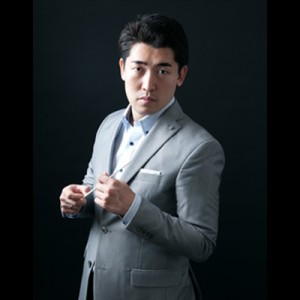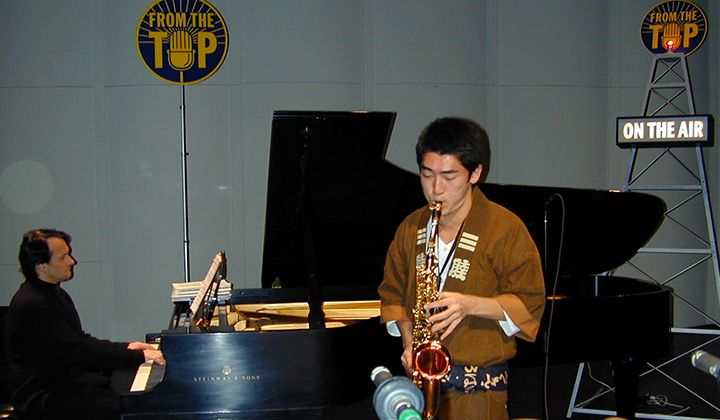Alumni Update: Keitaro Harada
Keitaro Harada first appeared on Show 91, recorded at the Interlochen Arts Academy in 2003, at the age of 18. Then, he came back for From the Top’s 10th Anniversary celebration on Show 216 in 2010 at age 25. Recently, From the Top’s Admissions & Alumni Relations Assistant Janet Fagan caught up with him. Here’s what he’s up to now!
Conductor and alum Keitaro Harada is going places – fast! Keitaro is the newly appointed Associate Conductor of the Cincinnati Symphony and Pops Orchestras. In addition, he holds positions as Associate Conductor of the Arizona Opera and Associate Conductor of the Richmond Symphony. A native of Tokyo, Japan, Kei, as he likes to be called, began his musical career playing classical saxophone. He is a graduate of Interlochen Arts Academy in Michigan, Mercer University in Georgia, and the University of Arizona.
Kei has received numerous honors and awards, including the Solti Foundation US Career Assistance Award in 2014 and 2015, and the Seiji Ozawa Conducting Fellowship at the Tanglewood Music Festival. In 2013, he was showcased in the Bruno Walter National Conductor Preview as an emerging young conductor.
From the Top staff member Janet Fagan caught up with Kei between trips and asked him a few questions:
What were the highlights of your From the Top experiences?
When I was studying music at Interlochen, I began listening to NPR’s From the Top with Host Christopher O’Riley on Interlochen Public Radio. Show 91 was the first time I performed on a national radio broadcast, and the first time I was interviewed publicly. It was recorded at Interlochen, and performing on the stage where I had my daily morning rehearsal definitely took away my nerves.
In 2006, From the Top collaborated with Glencoe/McGraw Hill to create a music textbook called, Music! Its Role and Importance in Our Lives. They featured me in Chapter Seven, titled “Making Musical Decisions.” Because of that chapter, I have gotten numerous messages over the years from teachers around the US, including college friends who went into teaching. As a result, I’ve done numerous classroom video chats.
In 2010, I was invited back as one of ten successful alumni to help celebrate From the Top’s 10th anniversary on Show 216 in Ames, Iowa. There were already so many successful alumni, so I was really honored to be selected. I was 25 at the time, and the other participants were between 15 and 18, so I was able to share the stage with the new generation. I had a blast at that show!
Click here to watch this video from that show.
How did you discover your love of conducting?
I loved playing classical saxophone. However, while at Interlochen I fell in love with a girl from Korea. Her mother, a concert pianist, did not approve of a career in saxophone performance, and said I should become a conductor. For love’s sake, I pursued conducting. I didn’t end up staying with that girl, but I stuck with conducting!
The first thing I did was take a conducting class during Interlochen’s summer camp. At the end of the summer, I won an audition to conduct the Interlochen theme at the final concert, and conducted a large ensemble in front of a huge crowd for the first time. I was “goose-bumpy” the whole time, and got all teary. It was a wonderful feeling, and I knew this was what I needed to do.
I wanted to study conducting in college, but I soon realized that not many classes existed for undergraduate students. I wrote to many major conservatories, but they all replied that I’d have to wait until graduate school.
As Keith Lockhart said, “You have to create opportunities for yourself, because the eternal irony of learning to conduct is that nobody will give you the opportunity to conduct until you’ve learned to conduct.” A pianist needs a piano to practice, and I needed an orchestra. Eventually my opportunities to conduct came via the Mercer/Macon Symphony Youth Orchestra and Phoenix Youth Symphony, where I became Music Director. As a child studying saxophone in Japan I had wonderful mentors and apprenticeships, but I never had the chance to join a youth orchestra. Conducting a youth orchestra was like making a musical circle for me. I was able to share what I learned from my mentors with the younger generation.
How do you juggle so many responsibilities between your conducting jobs?
I am now conducting for two orchestras and one opera company. I am studying scores, preparing for so many concerts, and flying every four days. In order to juggle all of this, I have three agents who manage everything for me so that I’m able to focus on my craft. I’ve gotten good at zoning everything else out and not getting distracted, so I study well at airports and on planes.
There’s always music flowing in my head. I love my work!
What are your goals for promoting classical music?
It’s interesting you ask me this now because tonight in Richmond I am conducting a concert in a brewery! I’d like to make classical music more accessible to the general public, and there’s got to be a way that young conductors can change the course of things. There’s a popular brewery in Richmond where millennials routinely go. So I’m bringing the Richmond Symphony there to play Bartok, Weber, and Mozart.
I think I can help the audience realize that the orchestra is really cool. Some of them may realize, “I would like to know more about the symphony.” Or, “That was cool. I’ll come back to these brewery concerts again.” This is a fun and important way of bringing music to a wider audience. I’m not worried about the noise, I’m sure that people will stop and listen. I’m going on stage with a beer bottle, which I will give to the concertmaster. My hope is to make people laugh and get them comfortable.
Click here to read the review of the brewery performance.
What advice would you give to young musicians?
Keep your passion, be honest with yourself and your capabilities, and don’t get discouraged because you think someone else is better. It’s not about competing with others; it’s about competing with yourself. It can sometimes be a battle between you and your instrument, but it should be a friendly battle and a pleasant journey.
What are your thoughts about the future?
Music is a living thing to me. I want to continue learning scores, understanding composers, and helping their music come to life. There’s so much to learn, and I’m excited to see how my career turns out.
To learn more about Kei and listen to his performances on From the Top, click here.





